人教版高中英语必修一Unit-5-Nelson Mandela grammar语法(共15张PPT)
文档属性
| 名称 | 人教版高中英语必修一Unit-5-Nelson Mandela grammar语法(共15张PPT) | 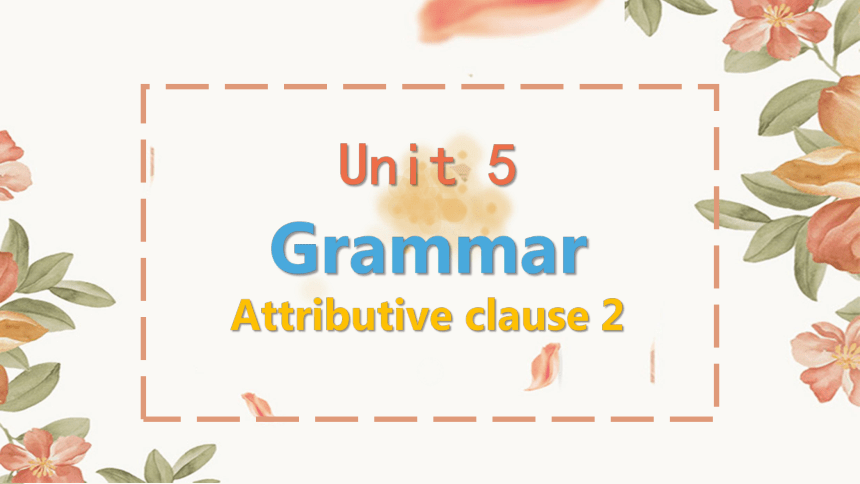 | |
| 格式 | zip | ||
| 文件大小 | 1.6MB | ||
| 资源类型 | 教案 | ||
| 版本资源 | 人教版(新课程标准) | ||
| 科目 | 英语 | ||
| 更新时间 | 2019-12-21 21:13:38 | ||
图片预览

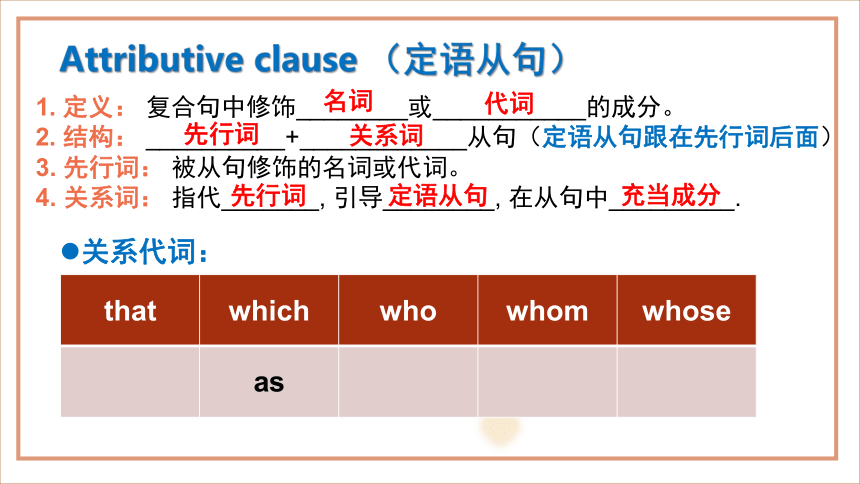
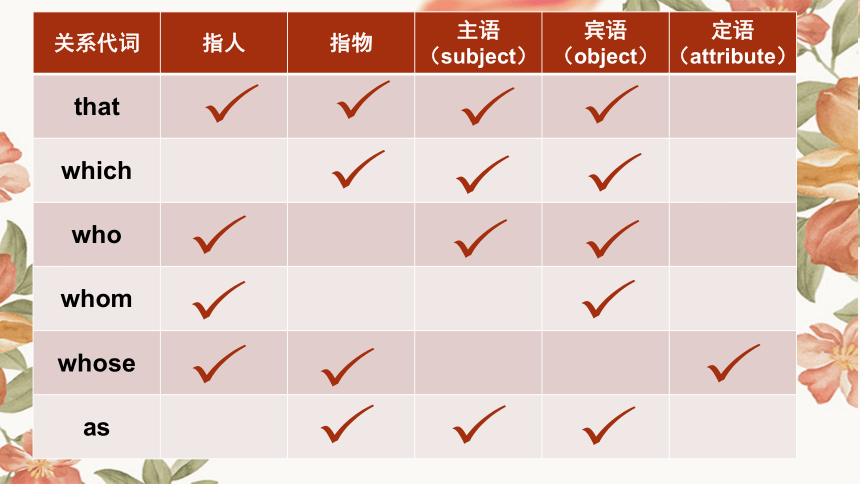
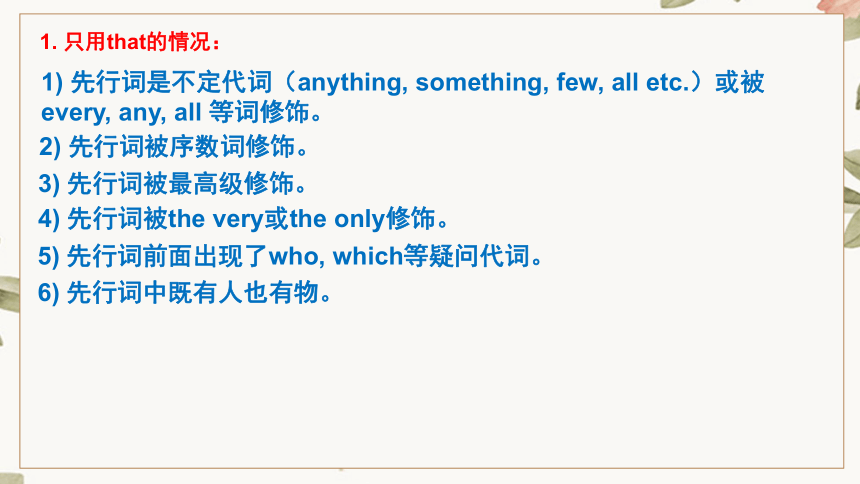
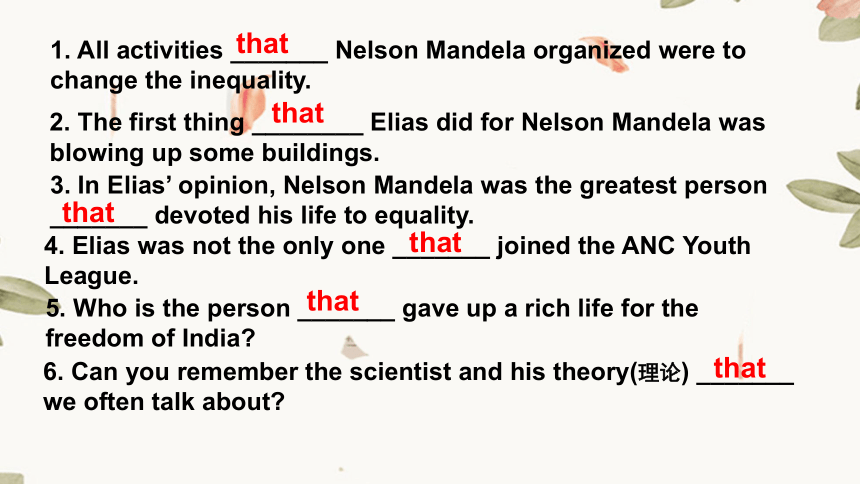
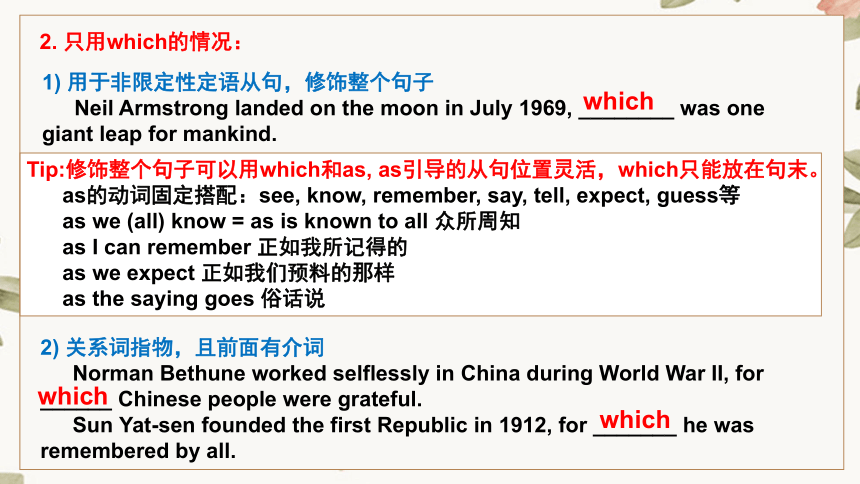
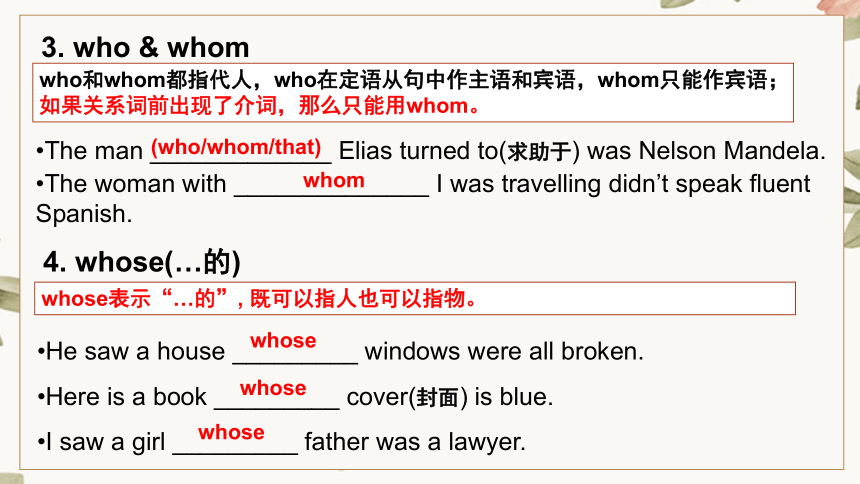
文档简介
(共15张PPT)
Unit 5
Grammar
Attributive clause 2
Attributive clause (定语从句)
1. 定义: 复合句中修饰________或___________的成分。
2. 结构: __________+____________从句(定语从句跟在先行词后面)
名词
代词
先行词
关系词
3. 先行词: 被从句修饰的名词或代词。
4. 关系词: 指代_______, 引导________, 在从句中_________.
先行词
定语从句
充当成分
that which who whom whose
as
关系代词:
关系代词 指人 指物 主语
(subject) 宾语
(object) 定语
(attribute)
that
which
who
whom
whose
as
1. 只用that的情况:
1) 先行词是不定代词(anything, something, few, all etc.)或被every, any, all 等词修饰。
2) 先行词被序数词修饰。
3) 先行词被最高级修饰。
4) 先行词被the very或the only修饰。
5) 先行词前面出现了who, which等疑问代词。
6) 先行词中既有人也有物。
1. All activities _______ Nelson Mandela organized were to change the inequality.
2. The first thing ________ Elias did for Nelson Mandela was blowing up some buildings.
3. In Elias’ opinion, Nelson Mandela was the greatest person _______ devoted his life to equality.
4. Elias was not the only one _______ joined the ANC Youth League.
5. Who is the person _______ gave up a rich life for the freedom of India?
6. Can you remember the scientist and his theory(理论) _______ we often talk about?
that
that
that
that
that
that
2. 只用which的情况:
1) 用于非限定性定语从句,修饰整个句子
Neil Armstrong landed on the moon in July 1969, ________ was one giant leap for mankind.
2) 关系词指物,且前面有介词
Norman Bethune worked selflessly in China during World War II, for ______ Chinese people were grateful.
Sun Yat-sen founded the first Republic in 1912, for _______ he was remembered by all.
Tip:修饰整个句子可以用which和as, as引导的从句位置灵活,which只能放在句末。
as的动词固定搭配:see, know, remember, say, tell, expect, guess等
as we (all) know = as is known to all 众所周知
as I can remember 正如我所记得的
as we expect 正如我们预料的那样
as the saying goes 俗话说
which
which
which
3. who & whom
who和whom都指代人,who在定语从句中作主语和宾语,whom只能作宾语;如果关系词前出现了介词,那么只能用whom。
The man _____________ Elias turned to(求助于) was Nelson Mandela.
The woman with ______________ I was travelling didn’t speak fluent Spanish.
(who/whom/that)
4. whose(…的)
whose表示“…的”, 既可以指人也可以指物。
He saw a house _________ windows were all broken.
Here is a book _________ cover(封面) is blue.
I saw a girl _________ father was a lawyer.
whom
whose
whose
whose
1.The time when I first met Nelson Mandela was a very difficult period of my life. (L. 2)
Para. 1
2. Mandela was the black lawyer to whom I went for advice. (L. 5)
3. He was generous with his time, for which I was grateful. (L. 7)
Para. 2
4. The school where I studied for only two years was three kilometres away. (L. 9)
5. However, this was a time when one had got to have a passbook to live in Johannesburg. (L. 13)
Para. 3
6. The day when Nelson Mandela helped me was one of my happiest. (L. 15)
7. Until today we have reached a stage where we have almost no rights at all. (L. 20)
Para. 4
8. They could not get the jobs they wanted. (L. 22)
9. The parts of town in which they had to live were decided by white people. (L. 22)
10. The places outside the towns where they were sent to live were the poorest parts of SA. (L. 23)
11. We were put into a position in which we had either to accept we were less important… (L. 25)
12. We first broke the law in a way which was peaceful. (L. 26)
relatives
(关系词) examples
which
省略
when
where
介词+which/whom
12. We first broke the law in a way which was peaceful. (L. 26)
8. They could not get the jobs they wanted. (L.22)
The time when I first Met… (L. 2)
5. However, this was a time when one had got to have a passbook… (L. 13)
6. The day when Nelson Mandela helped me… (L. 15)
4. The school where I studied for only two years… (L. 9)
7. Until today we have reached a stage where we have almost no… (L. 20)
10. The places outside the towns where they were sent to live… (L. 23)
2. Mandela was the black lawyer to whom I went for advice (L. 5)
3. He was generous with his time, for which I was grateful. (L. 7)
9. The parts of town in which they had to live were decided (L. 22)
11. We were put into a position in which we had either to… (L. 25)
when where why
介词+ which/whom
关系词 成分
关系代词
主语(that, which, who, as)
宾语 (that, which, who, whom, 省略, as)
定语(whose)
关系副词
地点状语(where)抽象地点/具体地点 where…
介词
+which/whom
2. Mandela was the black lawyer to whom I went for advice (L. 5)
3. He was generous with his time, for which I was grateful. (L. 7)
9. The parts of town in which they had to live were decided (L. 22)
11. We were put into a position in which we had either to… (L. 25)
介词+which
介词+which
for +which
时间状语(when) the day/ time when…
原因状语(why) the reason why…
I’ll never forget the time _______ which we worked on the farm.
This is the place _______ which we first met.
The reason ________ which he was late was unknown.
during
in
for
作状语,固定动词词组不能拆
when where why
介词+ which/whom
关系词 成分
关系代词
主语(that, which, who, as)
宾语 (that, which, who, whom, 省略, as)
定语(whose)
关系副词
地点状语(where)抽象地点/具体地点 where…
介词
+which/whom
2. Mandela was the black lawyer to whom I went for advice (L. 5)
3. He was generous with his time, for which I was grateful. (L. 7)
9. The parts of town in which they had to live were decided (L. 22)
11. We were put into a position in which we had either to… (L. 25)
介词+which
介词+which
for +which
时间状语(when) the day/ time when…
原因状语(why) the reason why…
I’ll never forget the time _______ which we worked on the farm.
This is the place _______ which we first met.
The reason ________ which he was late was unknown.
during
in
for
作状语,固定动词词组不能拆
关系副词where表地点状语
1)具体的地点
2)抽象的地点:某种境况,某种地步
4. The school where I studied for only two years… (L. 9)
10. The places outside the towns where they were sent to live… (L. 23)
7. Until today we have reached a stage where we have almost no… (L. 20)
e. g. situation(处境); point(界点); stage(阶段); case(情形)
Homework
Unit 5
Grammar
Attributive clause 2
Attributive clause (定语从句)
1. 定义: 复合句中修饰________或___________的成分。
2. 结构: __________+____________从句(定语从句跟在先行词后面)
名词
代词
先行词
关系词
3. 先行词: 被从句修饰的名词或代词。
4. 关系词: 指代_______, 引导________, 在从句中_________.
先行词
定语从句
充当成分
that which who whom whose
as
关系代词:
关系代词 指人 指物 主语
(subject) 宾语
(object) 定语
(attribute)
that
which
who
whom
whose
as
1. 只用that的情况:
1) 先行词是不定代词(anything, something, few, all etc.)或被every, any, all 等词修饰。
2) 先行词被序数词修饰。
3) 先行词被最高级修饰。
4) 先行词被the very或the only修饰。
5) 先行词前面出现了who, which等疑问代词。
6) 先行词中既有人也有物。
1. All activities _______ Nelson Mandela organized were to change the inequality.
2. The first thing ________ Elias did for Nelson Mandela was blowing up some buildings.
3. In Elias’ opinion, Nelson Mandela was the greatest person _______ devoted his life to equality.
4. Elias was not the only one _______ joined the ANC Youth League.
5. Who is the person _______ gave up a rich life for the freedom of India?
6. Can you remember the scientist and his theory(理论) _______ we often talk about?
that
that
that
that
that
that
2. 只用which的情况:
1) 用于非限定性定语从句,修饰整个句子
Neil Armstrong landed on the moon in July 1969, ________ was one giant leap for mankind.
2) 关系词指物,且前面有介词
Norman Bethune worked selflessly in China during World War II, for ______ Chinese people were grateful.
Sun Yat-sen founded the first Republic in 1912, for _______ he was remembered by all.
Tip:修饰整个句子可以用which和as, as引导的从句位置灵活,which只能放在句末。
as的动词固定搭配:see, know, remember, say, tell, expect, guess等
as we (all) know = as is known to all 众所周知
as I can remember 正如我所记得的
as we expect 正如我们预料的那样
as the saying goes 俗话说
which
which
which
3. who & whom
who和whom都指代人,who在定语从句中作主语和宾语,whom只能作宾语;如果关系词前出现了介词,那么只能用whom。
The man _____________ Elias turned to(求助于) was Nelson Mandela.
The woman with ______________ I was travelling didn’t speak fluent Spanish.
(who/whom/that)
4. whose(…的)
whose表示“…的”, 既可以指人也可以指物。
He saw a house _________ windows were all broken.
Here is a book _________ cover(封面) is blue.
I saw a girl _________ father was a lawyer.
whom
whose
whose
whose
1.The time when I first met Nelson Mandela was a very difficult period of my life. (L. 2)
Para. 1
2. Mandela was the black lawyer to whom I went for advice. (L. 5)
3. He was generous with his time, for which I was grateful. (L. 7)
Para. 2
4. The school where I studied for only two years was three kilometres away. (L. 9)
5. However, this was a time when one had got to have a passbook to live in Johannesburg. (L. 13)
Para. 3
6. The day when Nelson Mandela helped me was one of my happiest. (L. 15)
7. Until today we have reached a stage where we have almost no rights at all. (L. 20)
Para. 4
8. They could not get the jobs they wanted. (L. 22)
9. The parts of town in which they had to live were decided by white people. (L. 22)
10. The places outside the towns where they were sent to live were the poorest parts of SA. (L. 23)
11. We were put into a position in which we had either to accept we were less important… (L. 25)
12. We first broke the law in a way which was peaceful. (L. 26)
relatives
(关系词) examples
which
省略
when
where
介词+which/whom
12. We first broke the law in a way which was peaceful. (L. 26)
8. They could not get the jobs they wanted. (L.22)
The time when I first Met… (L. 2)
5. However, this was a time when one had got to have a passbook… (L. 13)
6. The day when Nelson Mandela helped me… (L. 15)
4. The school where I studied for only two years… (L. 9)
7. Until today we have reached a stage where we have almost no… (L. 20)
10. The places outside the towns where they were sent to live… (L. 23)
2. Mandela was the black lawyer to whom I went for advice (L. 5)
3. He was generous with his time, for which I was grateful. (L. 7)
9. The parts of town in which they had to live were decided (L. 22)
11. We were put into a position in which we had either to… (L. 25)
when where why
介词+ which/whom
关系词 成分
关系代词
主语(that, which, who, as)
宾语 (that, which, who, whom, 省略, as)
定语(whose)
关系副词
地点状语(where)抽象地点/具体地点 where…
介词
+which/whom
2. Mandela was the black lawyer to whom I went for advice (L. 5)
3. He was generous with his time, for which I was grateful. (L. 7)
9. The parts of town in which they had to live were decided (L. 22)
11. We were put into a position in which we had either to… (L. 25)
介词+which
介词+which
for +which
时间状语(when) the day/ time when…
原因状语(why) the reason why…
I’ll never forget the time _______ which we worked on the farm.
This is the place _______ which we first met.
The reason ________ which he was late was unknown.
during
in
for
作状语,固定动词词组不能拆
when where why
介词+ which/whom
关系词 成分
关系代词
主语(that, which, who, as)
宾语 (that, which, who, whom, 省略, as)
定语(whose)
关系副词
地点状语(where)抽象地点/具体地点 where…
介词
+which/whom
2. Mandela was the black lawyer to whom I went for advice (L. 5)
3. He was generous with his time, for which I was grateful. (L. 7)
9. The parts of town in which they had to live were decided (L. 22)
11. We were put into a position in which we had either to… (L. 25)
介词+which
介词+which
for +which
时间状语(when) the day/ time when…
原因状语(why) the reason why…
I’ll never forget the time _______ which we worked on the farm.
This is the place _______ which we first met.
The reason ________ which he was late was unknown.
during
in
for
作状语,固定动词词组不能拆
关系副词where表地点状语
1)具体的地点
2)抽象的地点:某种境况,某种地步
4. The school where I studied for only two years… (L. 9)
10. The places outside the towns where they were sent to live… (L. 23)
7. Until today we have reached a stage where we have almost no… (L. 20)
e. g. situation(处境); point(界点); stage(阶段); case(情形)
Homework
